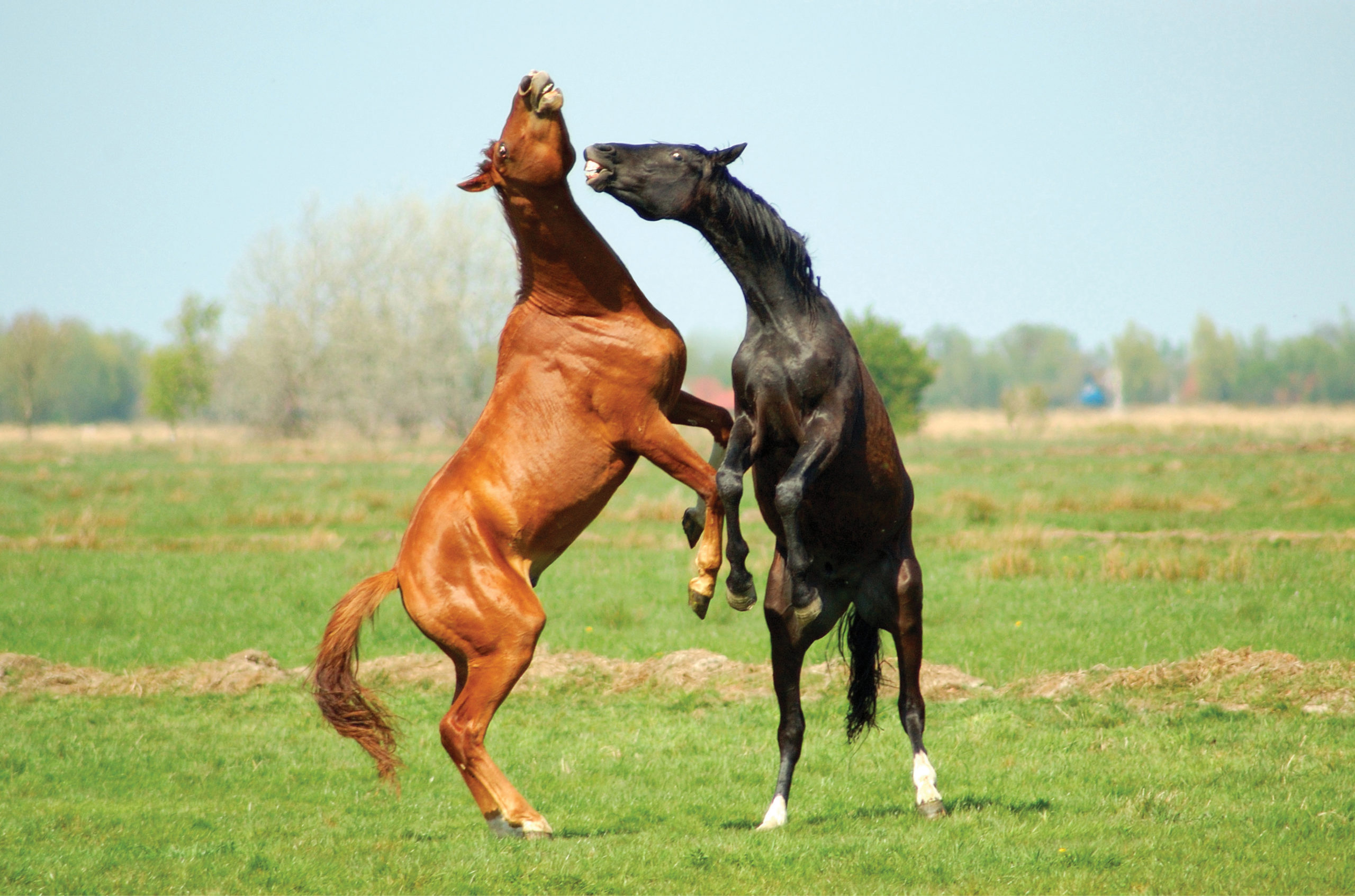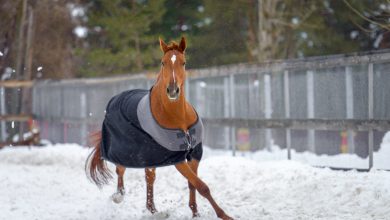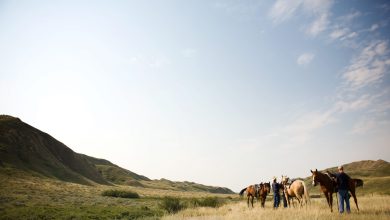
With nice anticipation and hopes for the longer term, we welcome younger horses into the world and into our lives. Getting that teenager from new child foal to a dependable driving companion is a journey requiring time, effort, data, endurance, and in lots of circumstances, fortitude. A younger horse will check you, and in case you’ve by no means raised one earlier than, you’ll must be ready.
As horses are all people, your expertise along with your teenager could range from some others, however there are a couple of behaviors you might be nearly sure to come across with any younger horse, to various levels. A few of these might be merely aggravating with the potential for hazard, whereas others are downright harmful, particularly as your horse grows bigger and stronger. Right here we’ll take a look at some undesirable behaviors that younger horses exhibit and clarify what’s behind these behaviors. We’ll additionally provide some strategies of stopping or diverting these behaviors.
The Roots of Undesirable Behaviors
Should you haven’t labored with younger horses earlier than, it’s simple to imagine that domesticated horses can be properly behaved whilst kids, and that harmful habits has been bred out of them. Nevertheless, younger horses are affected by their instincts whether or not they’re raised in a secure or operating free on the plains. If left to nature, a well-bred efficiency horse foal will develop behaviors simply as a wild mustang foal would.
Chances are you’ll encounter undesirable behaviors with any younger horse, whether or not a colt or a filly, however it’s properly documented that aggressive behaviors, comparable to biting and hanging, are far more widespread with colts. In actual fact, you’ll be able to count on colts to exhibit these behaviors, based mostly on the hormones current of their methods from earlier than beginning. Colts’ brains are masculinized in utero, so even gelding a colt doesn’t remedy each downside associated to hormones.

When colts play, they’re practising being stallions later in life. To achieve success within the wild, a colt should go on his genes, and he does that by having the ability to defeat one other stallion The very nature of their play is aggressive and if acted out on people, might be very harmful. Although much less widespread, fillies might also exhibit these behaviors, so be conscious of their presence, and look ahead to any habits that you simply’ll wish to cease earlier than it turns into recurring. A chew from a filly can harm as a lot as one from a colt, and a mare who has been allowed to develop aggressive habits can be harmful.
In nature, a younger horse’s most intense time for play habits is roughly the primary two years of life, after which he regularly grows out of it. Nevertheless, if he learns he can intimidate folks whereas in that interval of play, he could proceed to behave out by biting, hanging, or barging (strolling into and over folks, whether or not it’s a handler or bystander). It’s crucial to stop a teenager, regardless of how younger, from performing out these behaviors on folks as a result of he’ll turn out to be solely greater, stronger, and extra harmful in a short time.
[Learn More: Horse&Rider OnDemand- Colts]Frequent Undesirable Behaviors
Biting: Most biting by younger horses, whether or not directed at folks or different horses, is more likely to be male play. As colts observe preventing, they’ll shortly snake their heads in for a chew and even lunge with bared enamel. Bites from fillies usually tend to be grooming bites, however these can harm and trigger damage, too.
Biting is a gradual growth, with kids play biting even earlier than they’re weaned. It’ll turn out to be extra pronounced at about six months outdated and may become a substantial downside by the point a horse is a yearling. If a younger horse bites an older horse, the bitten horse will usually make it clear to the colt or filly that it’s unacceptable. Older horses are normally efficient at placing kids of their place. If a colt bites a filly, most frequently the filly will depart his proximity if she will, or she could even attempt to kick at him.
Nip it within the bud: At all times keep vigilant in a younger horse’s presence. Use clicker coaching (see sidebar on web page 76) to coach your horse to show his head away from you. This optimistic reinforcement train will educate him that if you give a particular command, he’s to show his head away. This accomplishes two issues—it bodily separates you from his enamel and it redirects his focus by letting him observe following your instructions.
For a younger horse that appears to be principally exploring along with his mouth, slightly than aggressively biting, present toys designed for horses. There are lots of in the marketplace which might be protected and efficient at letting horses use their mouths to discover or scale back boredom.
Placing: Much more sex-specific than biting, hanging can be linked intently in younger horses to male play and is observe for preventing as grownup stallions. If a filly strikes, it’s usually achieved in response to one thing painful or horrifying slightly than in play or aggression. Nevertheless, if a colt threatens or hurts a filly, she’s extra more likely to flip and kick at him with a hind foot than to strike at him with a entrance foot.
[Read More: Exercise is Key for Colts]A younger horse could strike at an individual, significantly when on a lead line, however most frequently will strike at one other horse, usually one other male. Horses hanging at one another could cause accidents, so take nice care when introducing horses to one another or introducing a brand new horse into a bunch. Introductions amongst horses ought to be achieved incrementally, throughout fences, or from adjoining paddocks.

Nip it within the bud: You need to put an finish to hanging when your horse may be very younger to keep away from the chance of a strike with extra top and energy as he matures. As you lead him, give agency steerage along with your proper hand on the lead line near his halter, the tail of the lead line, and a driving crop in your left hand. Maintain his ft busy by transferring him at a businesslike tempo.
At all times look the place you’re going so that you convey authority and may give clear course to him however maintain your peripheral imaginative and prescient alert for his actions. In very younger foals, minor friskiness could also be acceptable, but when he exhibits any tendency to throw a entrance hoof at you, instantly wave the crop at him and warn him along with your loudest, deepest voice to maintain again from you. Should you’re conscious and ready sufficient, you might even be capable to pop him with the crop on the leg as he’s hanging. Your aim is to right away get after him with a loud, aggressive show of motion and voice to completely startle him. This can assist set up your authority in order that he by no means considers difficult you with a entrance hoof once more.
Barging: Many younger horses, each colts and fillies, will do this habits wherein they stroll proper into folks to get to what they need or the place they wish to go, particularly when feed is concerned. Kids that aren’t corrected will proceed utilizing their weight and dimension over folks into maturity.
Barging occurs amongst teams of horses within the wild and within the pasture. Horses kind hierarchies amongst themselves, and a dominant horse will transfer subordinate horses out of his method by bodily pushing them if wanted. The necessity to bodily stress different horses evolves because the dominant horse’s standing is cemented within the minds of the others-—they are going to quickly transfer out of the dominant horse’s method merely upon his strategy.
Nip it within the bud: You need to educate your younger horse to respect your private area. Even a foal might be able to knock you down, and he turns into extra harmful the larger he grows. Clicker coaching can lay a basis for ending this habits.
Your aim with this clicker coaching is to show your horse to take a step again from you upon listening to a phrase you’ve chosen comparable to “again” or “away.” The one time he receives a reward can be when he takes a step again from you. Accurately utilized clicker coaching will assist usher a younger horse by way of his youthful urges to dominate you along with his dimension since bodily pushing again towards a horse might be ineffective, inconceivable, and harmful.
Follow the clicker coaching throughout quiet, undisturbed coaching classes, and finally randomize the rewards for these events if you don’t have meals useful. In case your horse steps away from you on command and waits patiently when you have feed in hand, he also needs to reply to that command below nearly every other circumstance.


